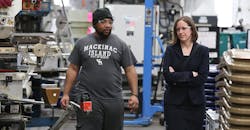Cascade Engineering CEO: Why Engagement Matters to Company Culture
Christina Keller, CEO of Cascade Engineering, which manufactures large plastic injection moldings, certainly walks the talk.
The first thing you see on their website is “Business with a Different Mindset – through engineering, manufacturing and a meaningful culture, we’re devoted to making things better – people, planet and profit.”
The family-owned business, based in Grand Rapids, Mich., has achieved several milestones over the years including manufacturing the first injected molded grille for Navistar’s heavy truck, as well as the first plastic car which they produced as a concept car for Chrysler. These achievements were possible due to a highly engaged workforce, says Keller.
EHS Today talked with Keller to find out how this all started and why it’s so important to her company’s success.
EHS Today: How did your company’s culture develop?
Christina Keller: The company was founded over 40 years ago by my father, Fred Keller. His philosophy was to do all the good you can, all the ways you can and for as long as you can.
So, the company was always a purpose-driven organization. Our goal is to have a positive impact on society, the environment and be financially viable.
As a family-owned business, we are in this for the long run and for generations to come. You can’t outpace your community, employees or environment so you need to rise all boats.
EHS Today: How does this philosophy apply to your workforce?
Keller: One of the most important things we do is socially responsible hiring. We were one of the first companies to participate in a welfare to career program. We walked alongside the people in this system and asked what the barriers to employment were. Most were just basic issues of childcare and transportation. So, we worked with area agencies to provide those services. We also have a social worker on-site.
We helped start a group, with other area manufacturers, called The Source. It’s a non-profit employee support organization that helps employees in a variety of way including providing training, helping with housing, transportation, financial counseling and other services that help people stay in the workplace and move up the ladder.
EHS Today: Are there other non-traditional workforces that your company employs?
Keller: Yes, we have employed over 1000 returning citizens, which are those people who are former felons. In Michigan alone, annually 9,000 people are released from prison. And they face a number of barriers to employment. But once those are overcome general statistics have shown that these workers stay for seven years which is a strong number.
EHS Today: Another issue related to culture that I noticed is that your company has anti-racism as part of your message.
Keller: On our website, we state that we are an anti-racism organization, which means that we are creating an environment where all employees regardless of the color of their skin, know they are valued.
Our statement says "We acknowledge that racism can be unconscious or unintentional and identifying racism as an issue does not automatically mean those involved in the act are racist or intended the negative impact.” Acknowledging this issue is part of the process of making sure that we are a welcoming organization. We talk about this at orientation and we hold refresher courses every two years.
EHS Today: How does your culture affect operations?
Keller: While we use traditional manufacturing methods of measuring our success, including our own lean program, we also measure how we are doing on our goals for our employees. Those goals include a safe, healthy work environment that also offers opportunities for learning. We measure the engagement level of our employees. Every year we see positive feedback, but we are continually looking at our workforce to ensure they are feeling positive and we tailor programs to correct any issues.
The end goal is that we want to be an employer of choice and we feel our culture helps us achieve that.
